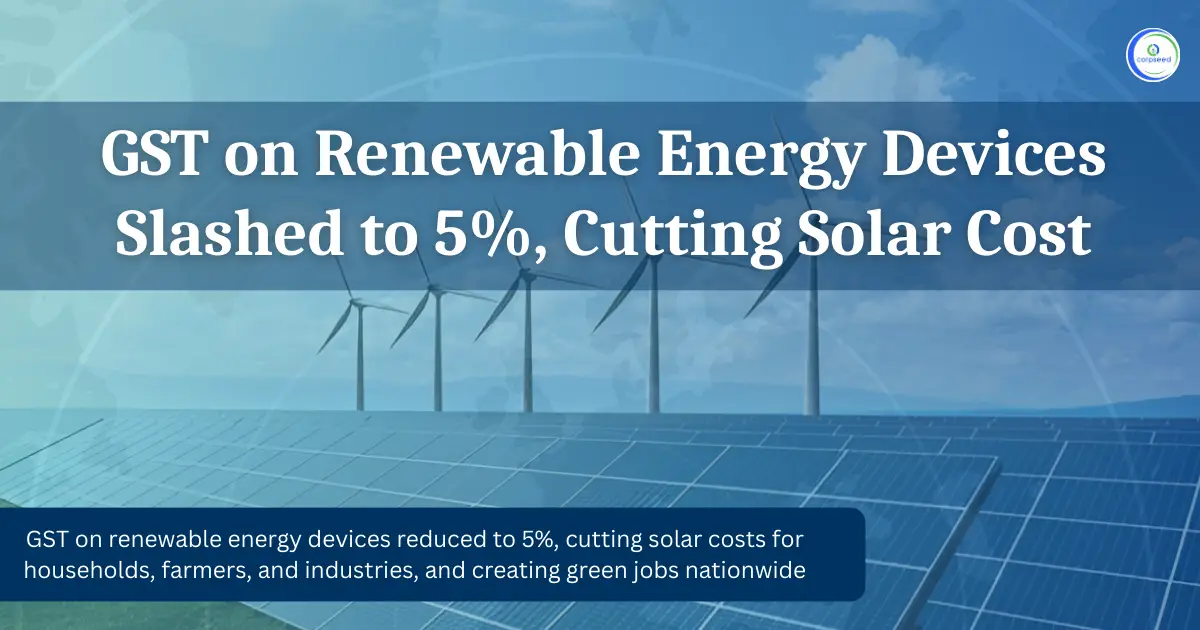India has taken a major step towards promoting clean energy. GST on renewable energy equipment has been reduced from 12% to 5%. This decision came from the 56th meeting of the GST Council held on September 3, 2025.
Table of Contents
This drop is expected to reduce the cost of clean energy projects across the country. Households, farmers, industries, and project developers will all benefit directly.
For large solar projects, which usually cost Rs 3.5-4 crore per MW, the GST cut saves Rs 20-25 lakh per MW. A 500 MW solar park can now save over Rs 100 crore, making solar energy more competitive and electricity cheaper.
Cheaper Solar for Homes and Farmers
Households implementing rooftop solar systems under the PM Surya Ghar: Muft Bijli Yojana will now save Rs 9,000-10,500 on a usual 3 kW system. This makes solar energy more reachable to millions of families.
Farmers will also benefit under the PM-KUSUM scheme. A 5 HP solar pump, which generally costs Rs 2.5 lakh, will now cost about Rs 17,500 less. Farmers can collectively save Rs 1,750 crore on 10 lakh solar pumps.
Solar water pumps, mini-grids, and livelihood applications will be rapidly adopted in rural areas. Schools, health centers, and small businesses will get access to clean, reliable energy with short payback periods.
Boost to Domestic Manufacturing and Jobs
The GST cut will reduce the cost of modules and components by 3- 4%, which will support the Make in India and Atmanirbhar Bharat initiatives. India has set a target of 100 GW of solar manufacturing capacity by 2030, and these reforms will attract new investment in domestic manufacturing centers.
Each GW of manufacturing produces around 5,000 jobs. Therefore, GST reforms could create 5-7 lakh direct and indirect green jobs in the next decade, reinforcing India's renewable energy industrial ecosystem.
Driving India’s Clean Energy Transition
Lower costs will enhance investor confidence, allow for faster signing of power purchase agreements, and accelerate projects. India plans to add 300 GW of renewable energy capacity by 2030. Even a modest reduction in costs of 2-3% could free up Rs 1-1.5 lakh crore for further investment.
Quicker deployment of solar power could minimize CO₂ emissions by 50-70 million tonnes per year by 2030. The GST reduction is in line with India's Paris Agreement commitments and the target of 500 GW of non-fossil fuel capacity.
The revised GST rates will be applicable from September 22, 2025. Millions of consumers, farmers, and industrialists will benefit while encouraging green growth and energy independence.
The GST reduction makes renewable energy more affordable and accessible. It benefits households, farmers, and industries, promotes green jobs, and strengthens India's path towards sustainable development and energy self-reliance.
This portion of the site is for informational purposes only. The content is not legal advice. The statements and opinions are the expression of author, not corpseed, and have not been evaluated by corpseed for accuracy, completeness, or changes in the law.

